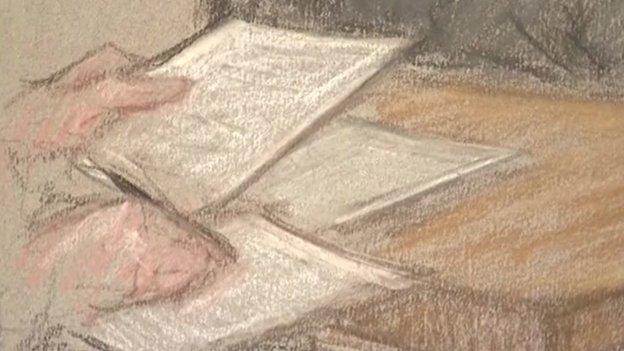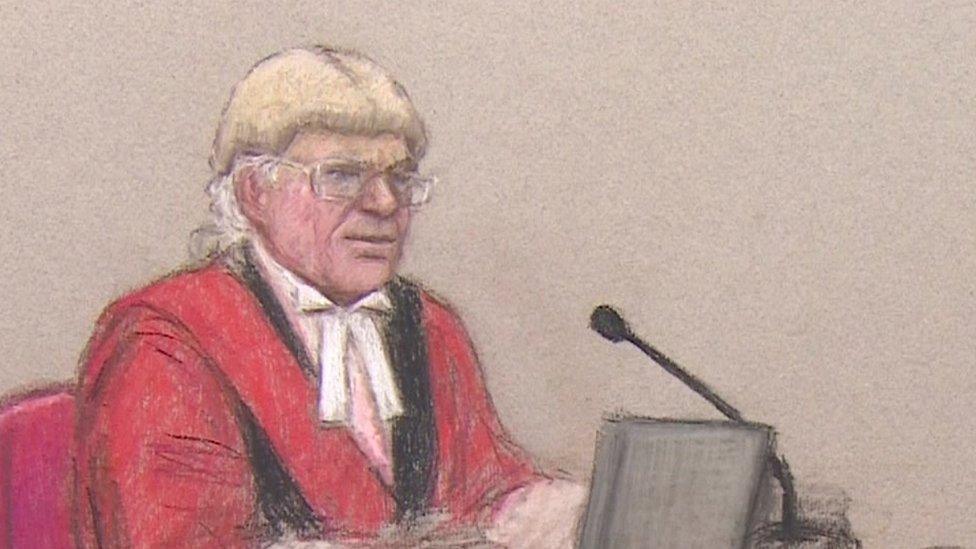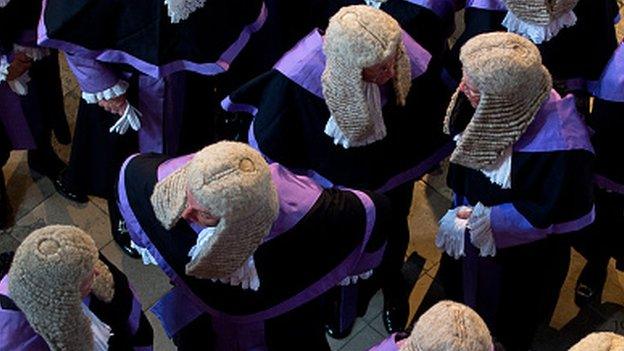Reporting restrictions: When can you take notes in court?
- Published

The right of members of the public to take notes of court proceedings is covered in an internal manual
When can you take notes in court?
As a reporter, I am used to getting out my notebook and writing down what's said by witnesses, lawyers and judges.
These days, you are just as likely to see reporters making notes on portable devices such as laptops and iPads.
Although some appeals may be televised live, photography and sound recordings are not generally allowed during a court hearing and courtroom artists must work from memory.
However, media representatives and legal commentators in England and Wales are allowed to send written reports of the proceedings directly from the court, using email or services such as Twitter, external.
Before this was first permitted at the end of 2010, reporters had to choose between delaying the news if they stayed in their seats and missing part of the story if they rushed out of court.
Open justice
However, members of the public who want to send written reports from the courtroom must ask court staff for permission from the judge.
Until recently, it was believed that no permission was needed for people sitting in the public gallery merely to make written notes of the proceedings.
Only last week, Lord Thomas of Cwmgiedd, Lord Chief Justice of England and Wales, recalled that "the principle of open justice is fundamental to the rule of law and to democratic accountability", external.

There is nothing to stop a member of the public briefing a future witness from memory
However, an internal document, the Crown Court Manual, distributed to staff by HM Courts and Tribunals Service and subsequently released in response to freedom-of-information requests, says there may be objections to note-taking for a "wrongful purpose".
That might arise when the intent was to brief a witness who is about to give evidence in a criminal trial.
Although it is normal practice for a witness to wait outside while others are giving evidence to the jury, and there may sometimes be security concerns, this seems a heavy-handed approach.
Routine ban 'wrong'
Evidence may normally be reported while a trial is proceeding and there would be nothing to stop a member of the public briefing a potential witness from memory.
But it emerged from a recent case, external that judges in Cardiff were routinely banning members of the public from taking notes in court without permission.
While stressing that the restriction did not apply to media representatives, the Crown Court described it as "a conventional rule and one which is designed to ensure that no prejudicial material leaves the Court through an inexperienced reporter".
However, the High Court ruled last week that this was "mistaken".
Granting a claim for judicial review, two senior judges said that an individual had been denied "the right to make notes of the proceedings in open court in breach of the common-law principle of open justice".
Approval in advance
Judges in other parts of the United Kingdom are more cautious about releasing court documents and allowing reporting of their proceedings.
In Northern Ireland, members of the public seeking to take notes in court must obtain the approval of the judge in advance.

Court artists who supply drawings of court figures to the media must do so from memory
According to a consultation paper issued by the Lord Chief Justice of Northern Ireland, external in December 2014, this requirement "may have developed as a response to risks to the defendant, witnesses, parties and their representatives or it may have been a precautionary measure to prevent notes being taken for a publication which could be in contempt of court".
The paper says that members of the public may not be aware of reporting restrictions in individual cases.
It suggests that decisions on allowing people to take notes in the courts of Northern Ireland should be made on a case-by-case basis, with a "strong presumption" in favour of granting permission.
The consultation in Northern Ireland closed almost a year ago and a practice direction will be published shortly.
It's expected that members of the public will be allowed to make notes on paper - unless the judge makes an order on an individual case - but the public will not be allowed to use electronic devices in court.
Register of journalists
Accredited journalists in Northern Ireland will be allowed to send tweets and emails without applying for permission.
In Scotland, a report to the Lord President, external recently recommended that there should be a register of journalists permitted to use Twitter and other forms of written communication from court.
The journalists - and others given permission to tweet on a case-by-case basis - would need to understand the restrictions in the Contempt of Court Act.
There is a move towards greater openness in the courts, with reporters being granted access to hearings in family and mental-health cases that were previously private.
But journalists are entitled to object if courts impose restrictions on open justice that cannot be justified.
- Published13 January 2016
